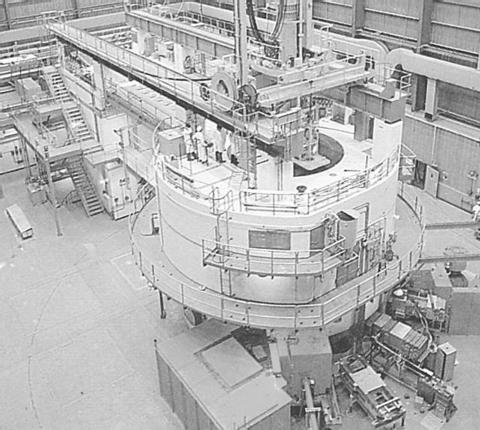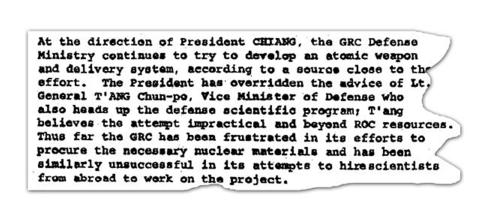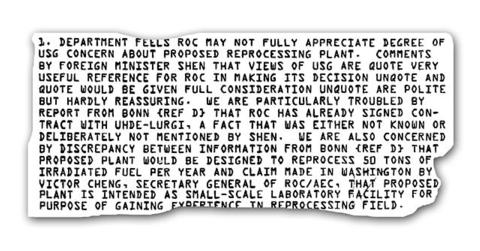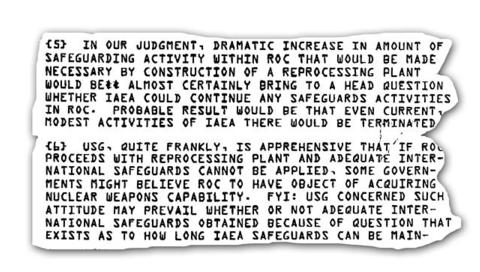Declassification and release of archive documents from the United States today, shows that Taiwan attempted to build nuclear weapons, despite government denials and US government opposition.
These formerly confidential files detail how the US State Department used its diplomatic influence and intelligence sources to promote non-proliferation and halt Taiwan's secretive nuclear weapons program.
But what the US government failed to do, the evidence suggests, was stop Taiwan from giving up entirely its ambition and ability to develop weapons of mass destruction.

SOURCE: THE ATOMIC ENERGY COUNCIL
The story begins in 1964, after China conducted its first nuclear test. Shortly afterward, Taiwan launched its own nuclear weapons program, dubbed the "Hsinchu Project."
There is contention over who was the principal figure behind the programme. Wu Ta-you (
This view was contradicted by National Taiwan University professor of history, Hsu Cho-yun, in a 1966 interview at the US Embassy in Taipei, who said Chiang Kai-shek was the motivating force.

"At the direction of President Chiang, the Chungshan Institute of Science and Technology, which superintends science research and development for the Ministry of National Defense, is continuing to push ahead with its program of developing an atomic weapon."
The quest for friends
Hsu said that Taiwan had difficulty finding nuclear materials for its research and its plans were often blocked.

Initially Taiwan asked the US and Israel for assistance, but the US flatly refused and Israel had its own security problems. Japan was approached but "reacted negatively, as it does to any effort to involve it in the development of nuclear weapons," an embassy document reported.
When Taiwan tried to buy a 50 megawatt heavy water nuclear power plant from the Federal Republic of Germany-based power company Siemens in 1967, the US issued a caution.
Nevertheless, that same year, the US' General Electric Corporation began construction of Taiwan's first nuclear power plant in the northeast part of the island.

Victor Cheng (
The US government later consented to support the sale of the German reactor, so that it would not appear to be contradicting itself and the reputation of the International Atomic Energy Agency to uphold safety standards.
"In view of unequivocal US statements of confidence in IAEA safeguard systems and US assurance to FRG [Federal Republic of Germany] that IAEA safeguards would not hinder German sales of nuclear equipment for peaceful purposes, the Department does not consider we should attempt to forestall sale through approach to either Siemens or FRG."

However, the telegram to the US embassy in Bonn added: "The Department (of state) intends to furnish FRG through other channels USG [US government] information on GRC purchase of Siemens reactor ... we are not yet convinced that purpose motivating GRC desire to buy Siemens reactor is unrelated to interest in nuclear weapons."
Intelligence information confirming this suspicion did get to the State Department, in December 1972, but by this time Taiwan's position in the international arena was already beginning to fade due to the emergence of China.
In 1971 Taiwan was pushed out of the United Nations and its continued participation in international organizations like IEAE was threatened.
After Taiwan lost its membership in the IEAE, a bilateral agreement with the United States -- which had backed efforts to build all three of the island's nuclear power plants -- continued to ensure that safety standards were being met.
"We recently learned that the ROC is considering the purchase of the essential parts for nuclear materials and reprocessing plant from commercial sources in the FRG. Such a plant reprocesses spent reactor cores and also produces significant quantities of plutonium, an essential component of nuclear weapons," a Dec. 14, 1972 memorandum said.
Cheng was advised of the US concern and "described the proposed reprocessing plant as a small scale laboratory exercise designed to develop experience in the reprocessing field," the memorandum added.
Small-scale research
Cheng further downplayed the matter, saying the facilities would cost US$250,000 and would be used to reprocess small amounts of spent reactor cores on an "experimental basis."
The US immediately pointed out to Taiwan that, according to the IEAE, strict standards had to be enforced for such a transfer to take place and that, in principle, the IEAE opposed the transfer of reprocessing plants to a "non-nuclear weapons state."
The US then began plying pressure on Germany and other countries that would be involved in the process. The IEAE board of governors in China also said they would not approve of the transfer.
In January 1973, US Embassy officials in Taiwan spoke to the foreign minister and urged him not to go ahead with the purchase.
The foreign minister, Shen Chang-huan (
Shen denied the idea of building a reprocessing plant had been approved by Taiwan's government, and did not tell the US that Taiwan had already signed a contract with a German firm to purchase the reprocessing plant.
The US confronted Shen over the matter, after which he told the US embassy that Taiwan would not be involved in the construction of a reprocessing plant, a February, 1973, memorandum confirms.
The US continued to monitor Taiwan's attempts to go ahead and construct a reprocessing facility on its own, but documents do not detail how Taiwan achieved this feat.
According to research by David Albright and Corey Gay, published in a "Bulletin of Atomic Scientists" article, entitled "Taiwan Nuclear Nightmare Averted," Taiwan continued on its own.
Their findings show that Taiwan began work in 1969 on uranium fuel, a reprocessing facility, and a plutonium chemistry laboratory.
These facilities were built with the help of equipment from France, Germany, the US and other countries, the article said.
From 1972 to 1974 Taiwan purchased about 100 metric tons of South African uranium, it said. It was also discovered that in 1970 a "Hot Laboratory" was being built and was expected to be completed in 1976.
Cheng, the AEC's secretary-general claimed the lab could only produce about 15 grams of plutonium a year, far short of that needed for a nuclear weapon, the article said.
The CIA concluded in 1974 that "Taipei conducts its small nuclear program with a weapon option clearly in mind, and it will be in a position to fabricate a nuclear device after five years or so," Albright and Gay wrote.
Under increasing international pressure on Sept. 14, 1976, Chiang Ching-kuo, then premier, said Taiwan would not engage in any reprocessing activities. That was not, however, the case.
It wasn't until over 10 years later, however, after the defection of a locally-recruited Central Intelligence agent, that Taiwan's program was brought to a halt.
Colonel Chang Hsien-yi (
Taiwan's official position since then has been that it will not use its scientific abilities to build nuclear weapons. But experts note that if Taiwan wanted to it could develop these weapons quickly, possibly within a year.

CHAOS: Iranians took to the streets playing celebratory music after reports of Khamenei’s death on Saturday, while mourners also gathered in Tehran yesterday Iranian Supreme Leader Ayatollah Ali Khamenei was killed in a major attack on Iran launched by Israel and the US, throwing the future of the Islamic republic into doubt and raising the risk of regional instability. Iranian state television and the state-run IRNA news agency announced the 86-year-old’s death early yesterday. US President Donald Trump said it gave Iranians their “greatest chance” to “take back” their country. The announcements came after a joint US and Israeli aerial bombardment that targeted Iranian military and governmental sites. Trump said the “heavy and pinpoint bombing” would continue through the week or as long

TRUST: The KMT said it respected the US’ timing and considerations, and hoped it would continue to honor its commitments to helping Taiwan bolster its defenses and deterrence US President Donald Trump is delaying a multibillion-dollar arms sale to Taiwan to ensure his visit to Beijing is successful, a New York Times report said. The weapons sales package has stalled in the US Department of State, the report said, citing US officials it did not identify. The White House has told agencies not to push forward ahead of Trump’s meeting with Chinese President Xi Jinping (習近平), it said. The two last month held a phone call to discuss trade and geopolitical flashpoints ahead of the summit. Xi raised the Taiwan issue and urged the US to handle arms sales to

A magnitude 5.6 earthquake struck off the coast of Yilan County at 12:37pm today, with clear shaking felt across much of northern Taiwan. There were no immediate reports of damage. The epicenter of the quake was 16.9km east-southeast of Yilan County Hall offshore at a depth of 66.8km, Central Weather Administration (CWA) data showed. The maximum intensity registered at a 4 in Yilan County’s Nanao Township (南澳) on Taiwan’s seven-tier scale. Other parts of Yilan, as well as certain areas of Hualien County, Taipei, New Taipei City, Taoyuan, Hsinchu County, Taichung and Miaoli County, recorded intensities of 3. Residents of Yilan County and Taipei received

Taiwan has secured another breakthrough in fruit exports, with jujubes, dragon fruit and lychees approved for shipment to the EU, the Ministry of Agriculture said yesterday. The Animal and Plant Health Inspection Agency on Thursday received formal notification of the approval from the EU, the ministry said, adding that the decision was expected to expand Taiwanese fruit producers’ access to high-end European markets. Taiwan exported 126 tonnes of lychees last year, valued at US$1.48 million, with Japan accounting for 102 tonnes. Other export destinations included New Zealand, Hong Kong, the US and Australia, ministry data showed. Jujube exports totaled 103 tonnes, valued at